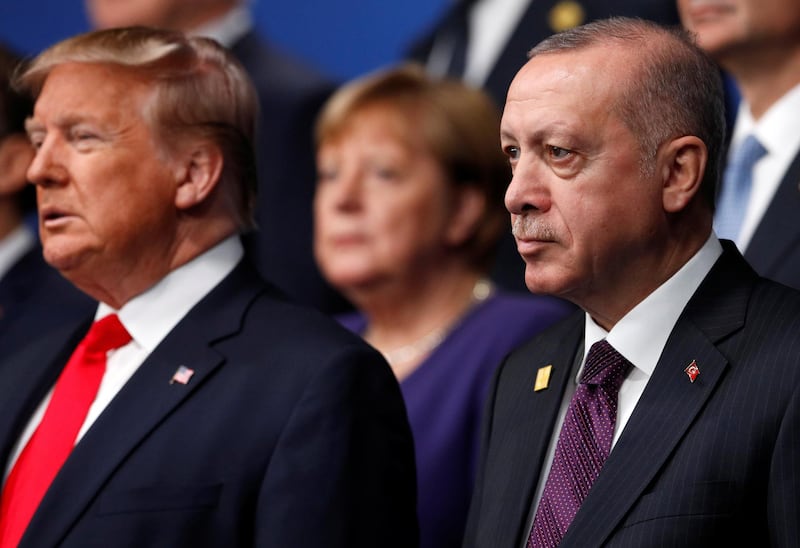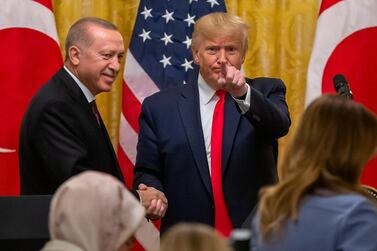Last week's Nato summit turned out to be quite the spectacle. Instead of joyful celebrations marking 70 years of the most successful military alliance in history, the event was marred by bickering and petty squabbles. Donald Trump left the summit early, skipping a final news conference after Prime Minister Justin Trudeau of Canada was caught on camera mocking the US president. Mr Trump called the leader of his country's northerly neighbour "two-faced" having earlier clashed with his French counterpart, Emmanuel Macron, for calling Nato "brain dead".
However, what was achieved was the avoidance of a major crisis with Turkey, which recently tested its Russian S-400 missile defence system against American F16 fighter jets. Before the summit, Ankara threatened to veto Nato’s plans for the defence of Poland and the Baltics unless Nato declare the Kurdish People’s Protection Units, or YPG, a terrorist organisation and support Turkey’s recent operation in Syria. Although the YPG was pivotal in the territorial defeat of ISIS, Ankara says that the YPG is indistinguishable from the Kurdistan Workers Party, or PKK, a separatist group that has waged war against the Turkish state since the 1980s.
Ultimately, Nato agreed to update its plan for the defence of Poland and the Baltics, while the final communique of the summit declared that “terrorism in all its forms and manifestations remains a persistent threat to us all”. However, this fell short of Ankara’s demands that the YPG be especially singled out.
Ankara backed down, begging the question why?
From purchasing Russian S-400s to Turkey’s role in a scheme to circumvent sanctions on Iran, Turkey has drifted away from the West in recent years. However, this does not mean that Ankara considers itself part of the Russian orbit or the Iranian axis.
From the perceptive of Ankara, Turkey is a great power in its own right with the potential to be even stronger. The only orbit that policy-makers in Ankara believe Turkey belongs to is its own. But in order for Turkey to fully realise its international potential, Ankara wishes to harness ties with multiple international and regional powers, especially those within its geographical proximity. This means Russia and Iran, and not just the West.
However, just as Turkey finds itself at odds with its traditional western allies, the same is true with its new friends. Russia is an alternative source for military hardware, an important trading partner and a country whose leader, Vladimir Putin, is on good terms with Turkey's president, Recep Tayyip Erdogan. Yet Russia is the guarantor of the Syrian regime of Bashar Al Assad while Turkish-backed forces and the military of the Assad regime consistently clash in Idlib. While Turkey wants to build stronger ties with Moscow, Ankara does not want Russia to dominate the Black Sea. And unlike the European Union and the US, Russia has not designated the PKK a terrorist group.
In the case of Iran, Turkey sees its neighbour to the East as an important source of energy and a potentially lucrative trading market. They also share common concerns about Kurdish separatism. However, ties between Iran and Turkey are marred by a history of competition dating back centuries and a contemporary desire for primacy in the Middle East. Both compete for influence in Central Asia, and, like Russia, Iran is supportive of the Assad regime. In Iraq, Ankara is critical of Iran’s influence, and Tehran and Baghdad object to the Turkish military presence in Bashiqa, near Mosul.
So, while Turkey has been drifting from its traditional allies in the West, Ankara knows it is not prudent to completely throw in its lot with Russia and Iran. Turkey recognises the benefits of its relations with Europe, its largest trading partner, the utility of ties with the US, and by extension, the Nato alliance.
Without Nato, Turkey is weak. Turkey may have the second-largest army within the alliance but after years of purges within the officer ranks, especially after the 2016 attempted coup, Turkey has lost personnel with significant experience and expertise. It will take years for its armed forces to fully recover.
Nato offers Turkey a security umbrella that Ankara does not wish to lose. Article 4 of the North Atlantic treaty calls for Nato members to “consult” with each other if they feel that their security is at risk. Article 5 considers an attack against one member-state an attack against them all. From the presence of Nato bases in Turkish territory to the use of Nato hardware, Turkey’s security is all but guaranteed. Meanwhile, Turkish officers in Brussels have access to training and intelligence-sharing, and it is through Nato that Turkey can be involved in joint missions where valuable experience is gained.
What this means is that at times the West can and should stand firm when facing pressure from Ankara. Despite Turkey’s drift from the West, Ankara knows that Nato continues to provide Turkey’s greatest security guarantee. This gives the West at least some leverage over Turkey and when the occasion calls, should not be afraid to use it.
Simon Waldman is an associate fellow at the Henry Jackson Society and a visiting research fellow at King's College London






